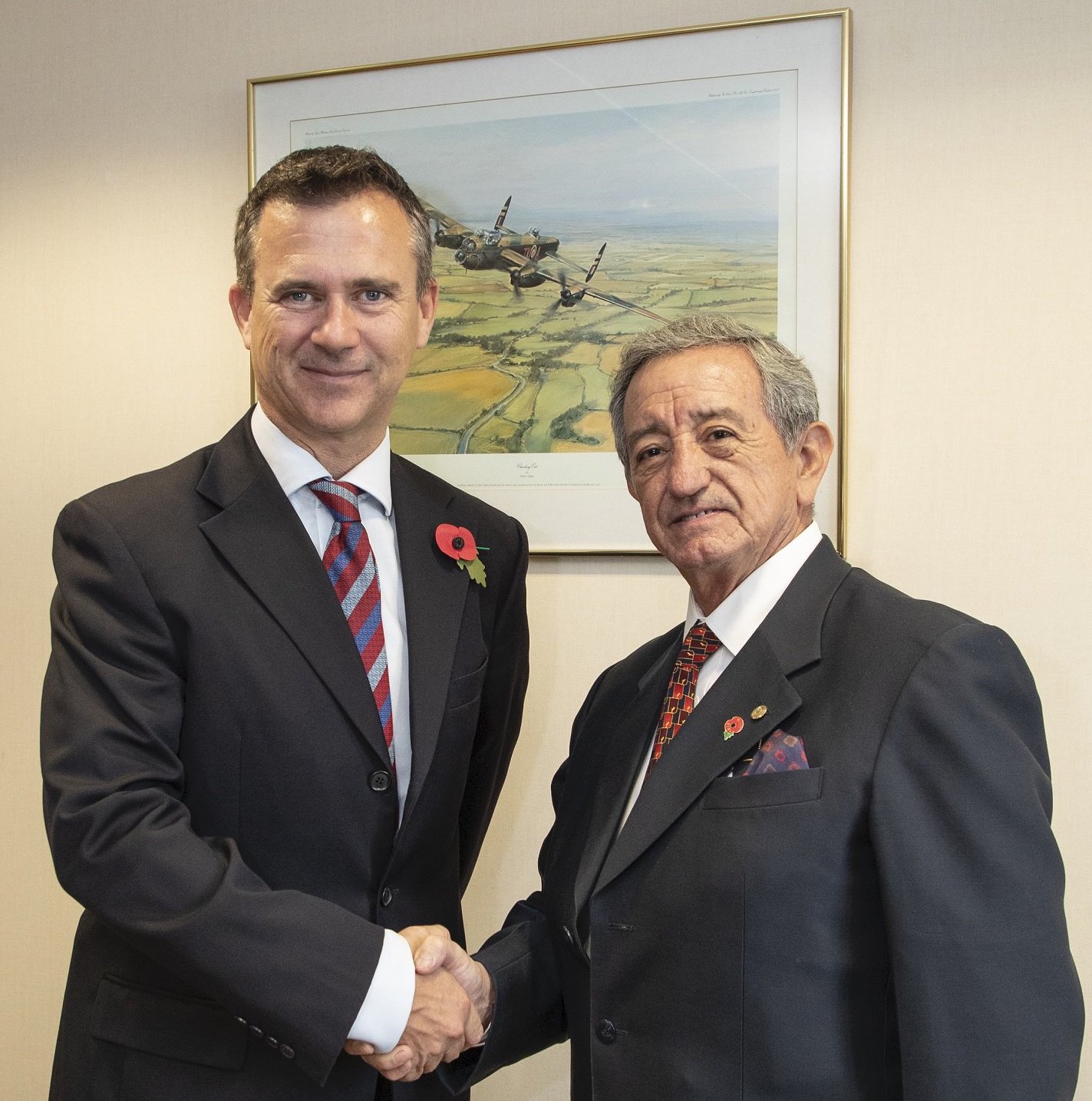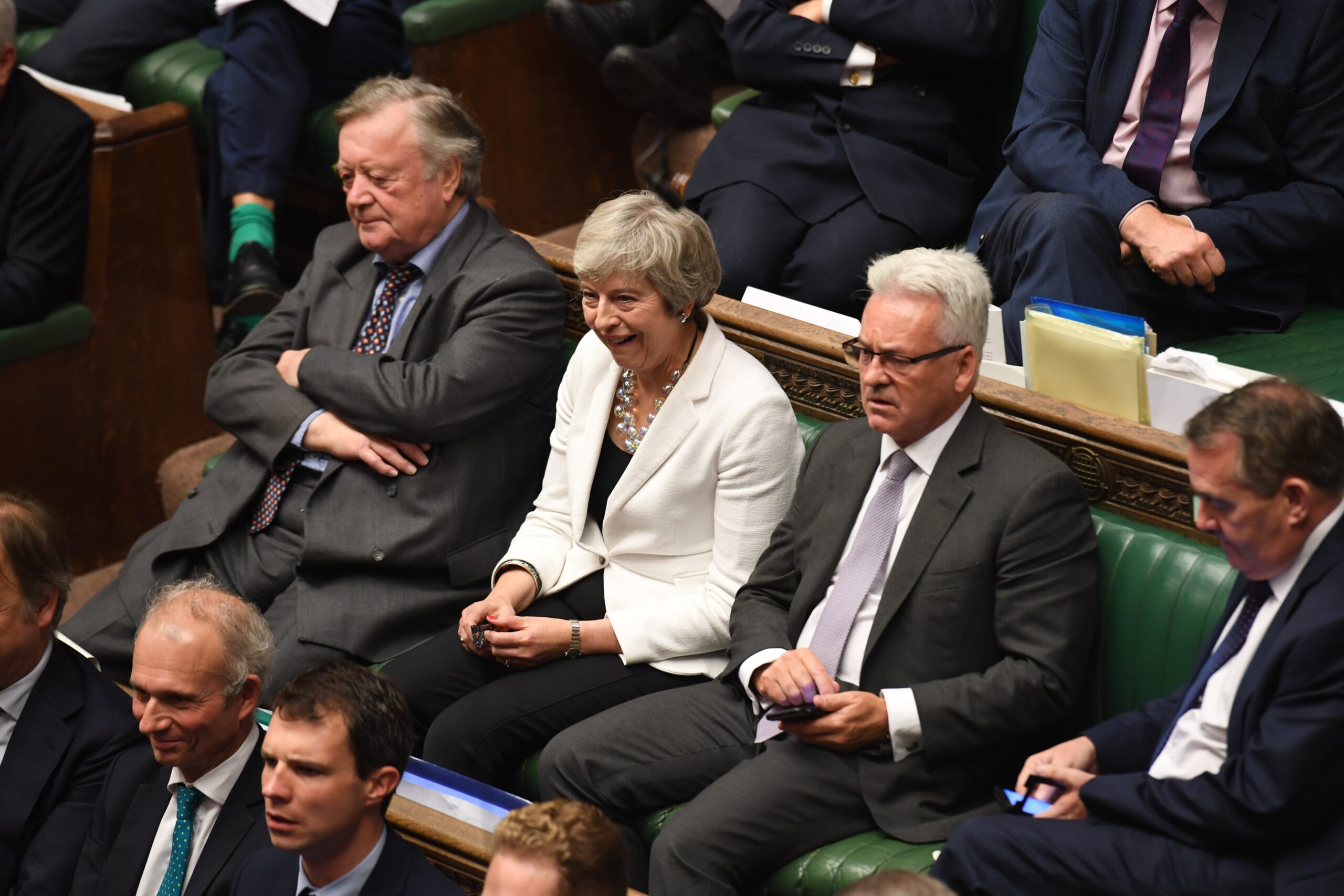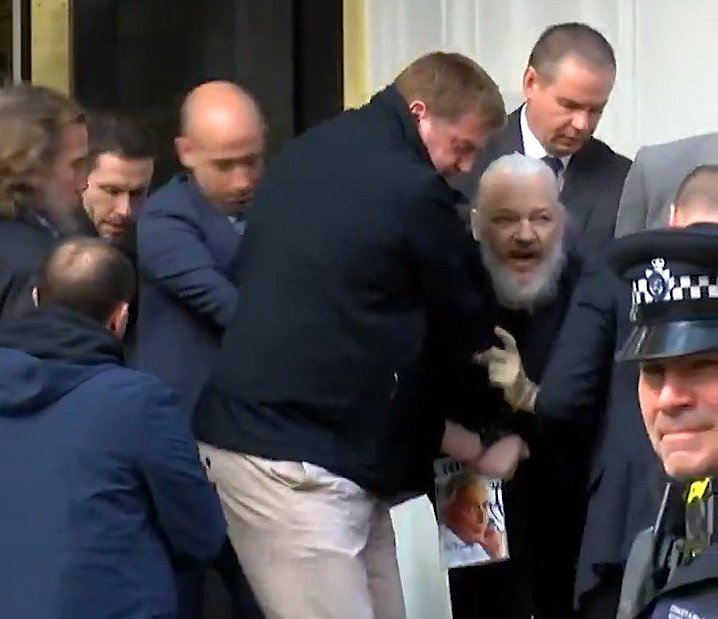A wide-ranging UK government campaign was brought to bear on Ecuador to press it to hand over WikiLeaks publisher Julian Assange, new information by Declassified UK reveals.
- Prime minister Theresa May was told in March 2018 to ‘butter up’ Ecuador’s president in order to get Assange out of Ecuadorian embassy in London
- Later in the year, May’s government spent £20,000 to bring Ecuadorian officials and defence minister to UK
- British foreign minister arranged Daily Mail hit piece on WikiLeaks publisher days after his eviction from the embassy
- Same minister gave Ecuador’s president a plate from Buckingham Palace gift shop to ‘say thank you’ for handing over Assange
- National security adviser Richard Moore, now head of MI6, was in Ecuador two weeks before Assange was expelled from embassy
By Matt Kennard
Declassified UK
 The UK government paid £8,330 in November 2018 to bring Ecuador’s defence minister Oswaldo Jarrín to Britain, two months before the planned seizure of Julian Assange from the Ecuadorian embassy in London, it can be revealed.
The UK government paid £8,330 in November 2018 to bring Ecuador’s defence minister Oswaldo Jarrín to Britain, two months before the planned seizure of Julian Assange from the Ecuadorian embassy in London, it can be revealed.
It is unusual for foreign ministers to have their trips to the UK paid by the British government, and the week-long visit came after Prime Minister Theresa May had been told to “butter up” Ecuador’s president, Lenín Moreno, in order to get Assange expelled from the embassy.
The new information comes from UK Foreign Office documents released to Declassified, as well as the recently published diaries of former foreign office minister, Sir Alan Duncan, who was a key player in the Assange negotiations.
The documents note that “the main objective” of the November 2018 visit was Jarrín’s “participation” at an annual national counter-terrorism exercise that rehearses the government’s response to a major terrorist attack.
The exercise is organised by the Office for Security and Counter-Terrorism, a part of the Home Office which “oversees the Security Service [MI5] and police counter-terrorism operations in the UK”.
It is unclear why Ecuador’s defence minister was chosen to attend a counter-terrorism exercise as the South American nation is not a target of terrorist groups.
The documents note that “one of the main meetings” was with then armed forces minister Mark Lancaster, after which the Ministry of Defence reported the two countries were “strengthening our ties”.
Jarrín also visited the Foreign Office’s “crisis centre” and met with the head of UK Export Finance, Louis Taylor.
Partner of Choice

British Armed Forces Minister Mark Lancaster (left) meets Ecuador’s Defence Minister, Oswaldo Jarrin, in the UK, 7 November 2018. (UK Ministry of Defence / Twitter)
Two months before Jarrín’s visit, in September 2018, the UK government had spent another £12,806 facilitating a three-day visit by Ecuadorian officials concerned with fighting corruption and money laundering in the country.
The evaluation of the trip noted that it helped the UK government to “build strong relationships” and that “the UK was subsequently commended as a partner of choice to President of the Republic [Lenín Moreno]”.
A Foreign Office spokesperson told Declassified: “The Foreign Office regularly arranges meetings with ministers and officials from other countries to encourage closer engagement with our international partners and help achieve our foreign policy objectives.”
She added: “As part of this work, some of the costs of these visits are occasionally covered by the Department or by Posts. These are carefully considered on a case by case basis, and only when resources are available.”
British security officials also visited Ecuador in the build-up to Assange’s exit from the embassy, government records show.
In July 2018, Philip Barton, then director general of security at the Foreign Office, flew to Ecuador for “short notice bilateral meetings” with its foreign ministry. A week after his return he travelled to Cheltenham for “meetings at GCHQ”, the UK’s largest intelligence agency, government travel logs show.
Then, two weeks before Assange was expelled from the embassy, on March 27, 2019, Britain’s then deputy national security adviser for intelligence, Richard Moore, spent £4,469 on a business-class flight to Ecuador, the logs show.
Moore was appointed chief of MI6, Britain’s external intelligence agency, just over a year later. Barton now runs the Foreign Office.
Delayed Expulsion
The two British-funded trips for Ecuadorian officials came as the government was ramping up efforts to get Ecuador to rescind the asylum it had granted Assange in 2012 to avoid persecution by the U.S. government.
Until now, the nature of these negotiations has remained mostly secret, and freedom of information requests relating to the Assange case and the role of British ministers are routinely blocked.
But the diaries of Sir Alan Duncan, who led the Assange negotiations as UK minister for the Americas, shed light on the pressure Britain brought to bear on Ecuador after the new government of Lenín Moreno assumed power in May 2017.
Moreno quickly undid most of the policies of his leftist predecessor Rafael Correa and aligned himself with the U.S., signing deals with the International Monetary Fund and making obvious his annoyance at Assange’s continued asylum at the country’s embassy in London.
In 2016, Duncan had met Correa’s foreign minister Guillaume Long who was still committed to upholding Assange’s right to asylum. An exasperated Duncan lamented in his diaries that Long “defends the supposed human rights of Julian Assange”.
But by March 2018, with the Moreno administration in place, Duncan was more hopeful and had a one-on-one meeting with prime minister Theresa May where he “updated her on Ecuador and Assange”. “She might want to butter up President Moreno”, he wrote.
Two weeks later, he added: “I think I am nearly there with Ecuador to get Julian Assange out of their London embassy. It’s taken months of delicate negotiations, but nearly nearly…”
Six months later, in September 2018, Duncan had a call with Ecuador’s new foreign minister José Valencia. “We both want Assange out of the embassy,” he wrote, “but the Ecuador government won’t quite yet take the necessary final step for fear of the domestic reaction.”
In the background, negotiations were clearly taking place which are not mentioned in Duncan’s diaries. In October 2018, Duncan noted: “The Assange issue is progressing. Our channels into Ecuador are paving the way to a solution.”
Then, on Jan. 8, 2019, Duncan wrote: “Annoyingly Assange’s forcible exit from the Ecuadorian embassy has been delayed. Ecuador’s government lawyers are now saying that it requires a Presidential decree which will take at least a week or two.”
Later on that day, Duncan went to the House of Commons to meet the new Ecuadorian Ambassador Jaime Marchán-Romero. “His principal mission is to get Assange out of the embassy — it has been six years — and although he had been aiming for tomorrow, as I’d just learnt it’s going to take longer. A tad frustrating, but we’ll get there”, Duncan wrote.
After this meeting, he “updated” then Foreign Secretary Jeremy Hunt on the situation.
Operation Pelican

Former Prime Minister Theresa May sitting between Father of the House Ken Clarke (l) and former Minister of State Sir Alan Duncan (r). (©UK Parliament/Jessica Taylor/ Stephen Pike/Flickr) creativecommons.org/licenses/by/3.0/
Duncan’s annoyance that Ecuador had delayed expelling Assange increased the following month when he wrote: “Internal meeting on Ecuador, who have gone quiet on pushing Assange out of the embassy despite saying it was going to happen on 9 January.”
He added: “It looks as though their Foreign Minister had said it would happen without explicitly telling the President. Assange is not mentally stable; he has been defecating in wastepaper bins… It is a disgusting situation. I insist we lay a clear paper trail tracking our constant demands that he be evicted”.
Soon after, he noted Ecuador’s ambassador “is determined to get Assange out of his embassy, but President Moreno requires a final push in order to be persuaded to press the button.”
After another meeting with the ambassador a fortnight later, Duncan noted: “We are so nearly there in getting Assange chucked out of the embassy.”
On April 11, 2019, the day Assange was finally seized by UK police, he wrote: “Suddenly it’s game on: I’m told Assange will be sprung from the [Ecuadorian] embassy today. So I drop everything and head to the Operations Room at the top of the Foreign Office. Operation Pelican is go — suitably assisted by one official wearing a pelican-motif tie.”
In the Operations Room, Duncan watched a live feed when at 10am plainclothes policemen entered the embassy.
“We were expecting Assange to be brought out very soon after their arrival, but texts to the Ops Room revealed he had caused a bit of a commotion and had been screaming and bawling while edging towards the Ambassador’s office — at which point he was forcibly restrained”.
He continued: “Then, with military precision, six police officers marched up to line up each side of the entrance steps, to form a protective corridor through which Assange was bundled out at about 10.20am.”
Duncan concluded: “So, job done at last — and we take a commemorative photo of Team Pelican. It had taken many months of patient diplomatic negotiation, and in the end it went off without a hitch. I do millions of interviews, trying to keep the smirk off my face.”
Aftermath
Two days after Assange’s eviction, on April 13, Duncan noted he “had put [Daily Mail journalist] Simon Walters in touch with Ambassador Marchán, thus giving the Daily Mail their scoop about the ‘fetid’ Assange hovel. The pictures of his living conditions were beyond repulsive.”
That day the Daily Mail ran a hit piece using photos from inside the embassy with apparently incriminating photos of unwashed plates in the kitchen. “Revealed, full squalid horror that drove embassy finally to kick him out”, the subtitle read.
The article alleged that Assange “left soiled underpants stuffed down the lavatory in a fit of rage”, but provided no evidence. Duncan’s allegations about Assange defecating in wastepaper bins from two months before were not included in the article.
Ten days later, Duncan met with Hugo Shorter, head of the Foreign Office’s Americas division. “We are both still basking in the successful release of Julian Assange”, he noted.
Then in mid-June 2019, with Assange having been incarcerated in Belmarsh maximum security prison for two months, Duncan put on a party. “[S]traight to drinks in my office for all the Operation Pelican team, those who worked on the removal of Julian Assange from the Ecuador embassy”, he wrote.
“I gave them each a signed photo which we took in the Ops Room on the day, with a caption saying ‘Julian Assange’s Special Brexit Team 11th April 2019’.”
Later on that month, Duncan went on an official trip to Quito, Ecuador’s capital city, for “bilateral meetings” with President Moreno, according to government records. Duncan’s diary is empty for these days he was in Ecuador.
But the final reference to Assange in his diaries comes two weeks later, on July 15, 2019, when he is in Ecuador again for another meeting with President Moreno.
“Visiting him to say thank you is an essential conclusion to the Assange episode and he exudes goodwill and warmth. He loves the UK, and I gave him a beautiful porcelain plate from the Buckingham Palace gift shop. Job done,” he wrote.
Other UK officials were also re-engaging with Ecuador after Operation Pelican was completed. In May 2019, the month after Ecuador had expelled Assange, trade minister George Hollingbery flew to Quito to sign the UK-Andean Countries Trade Agreement, according to UK government records.
Matt Kennard is head of investigations at Declassified UK, an investigative journalism organisation that covers the UK’s role in the world. Follow Declassified on Twitter, Facebook and YouTube. Sign up to receive Declassified’s monthly newsletter here. You can become a member and supporter of Declassified by visiting here.
Please Support Our
Spring Fund Drive!




This is, of course, hardly new behaviour for British governments of either stripe. Labour has its own skeletons, such as: “On the 50th anniversary of the end of the Biafran war, the world’s worst humanitarian crisis in the late 1960s, declassified British files show that Harold Wilson’s government secretly armed and backed Nigeria’s aggression against the secessionist region. The then Labour government secretly provided large quantities of arms to the Nigerian federal government which, by early 1970, had crushed an attempt by the country’s eastern region of Biafra to gain independence, which it had declared in May 1967.
During the three years of war, up to three million people died, as Nigeria enforced a blockade on Biafra, causing widespread starvation amid considerable international opposition to the conflict. British policy was mainly shaped by its oil interests, declassified government documents from the time show. “Our direct interests are trade and investment, including an important stake by Shell/BP in the eastern region,” the Foreign Office noted a few days before the outbreak of the war in 1967. ”
hXXps://www.dailymaverick.co.za/article/2020-04-29-how-britains-labour-government-facilitated-the-massacre-of-biafrans-in-nigeria-to-protect-its-oil-interests/
That was a crime against humanity, surely. Who has apologised? And now we have the Julian Assange denial of basic human rights. Why would anyone who doesn’t side with power trust any British government politician or official?
By virtue of these disgraceful actions the governments of both Ecuador and the UK have thoroughly discredited their own legitimacy.
May they burn in hell.
Julian Assange’ sacrifice for the benefit of humanity will not be forgotten.
FREE HIM NOW!
Israel regarded Duncan a Conservative deputy foreign minister, as too pro-Palestinian
and thus plotted to ‘take him down,’ Al Jazeera revealed in its documentary “The Lobby”.
So instead of being PEP (progressive except on Palestine)
it seems he’s REP (reactionary except on Palestine)
The apparent cooperation and coordination of The Guardian newspaper in publishing false stories re: Assange as part of HMG’s effort to convince the Ecuadorian officials to remove Assange is another appalling revelation related to this. The legacy media is effectively an active participant in government hybrid information warfare schemes.
It’s interesting to note that after the initial diplomatic efforts to “butter up” the duplicitous Moreno and his officials two top National Security Officers Barton and Moore were sent to Ecuador to soften up any opposition to “Operation Pelican” and solidify co-operation of the Ecuadorian authorities in the abduction of Assange from the Embassy. These same officials were later famously promoted Moore to head of M16 and Barton to head of the UK Foreign Office (rebranded as the more benign sounding Foreign and Commonwealth Development Office). These two now run the UK/US puppet show in Ukraine playing the poor wretch Zelensky between a rock and a hard place until he breaks and the Ukronazis take over and force the Ukrainian Military to massively assault their Russian speaking countrymen in the Donbass enclave. Needless to say nothing deters the current head of M16 (UK’s Secret Intelligence Service SIS) from facing off the Russians since he enjoys challenging Putin personally and states openly that Russia is a country in decline.
The Brits establishment are a total rancid meat pie.
The Royals at Buckingham are royal sacks of purifying offal.
Duncan lamented in his diaries that Long “defends the supposed human rights of Julian Assange”.
There you have it. Human rights are not universal. They are only afforded to those who do not challenge the state.
Love that quote and so true
Another example, if one was needed, of the truly evil people who inhabit Westminster.